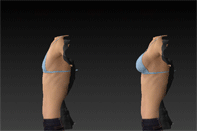Spring has sprung and you know what that means… summer is just around the corner. With the warmer weather fast approaching many people start to think about getting into shape so they can look their best while at the beach or the pool. Workouts and diets start to ramp up during this time in anticipation of being outdoors, but what if all your hard work isn’t showing the results you’re looking for?
In addition to specializing in breast implants and augmentation, here at Dr. Adams Plastic Surgery in Dallas, we also offer a variety of other surgical and non-surgical procedures to help tighten up your tummy and abs.
Non-surgical procedures like Thermi-Tight and Ultherapy Skin Tightening can help tighten up loose skin and wrinkles to make your skin look young and healthy again. These treatments can help in some situations, but if you’re looking to really reduce stretch marks, remove saggy skin and stretched muscles, then a tummy tuck procedure is going to be your best option.
What is a Tummy Tuck?
A tummy tuck, also known as an abdominoplasty, is a surgical procedure which is used to help flatten your abdominal area by removing loose skin and excess fat, while also tightening up the muscles underneath.
It is designed to give you a fitter look around the midsection when exercise and diet don’t quite cut it. The procedure can also be used to remove stretch marks while also restructuring the look and shape of your abdomen.
Sometimes our bodies just don’t do what we want them too even with copious amounts of exercise and healthy eating, and that’s where a tummy tuck can help.
How is a Tummy Tuck Performed?
There are actually two different kinds of tummy tucks that you can receive, a full tummy tuck and a mini tummy tuck, but for the sake of this article we’re going to be discussing the full tummy tuck.
A full tummy tuck is generally performed under general anesthesia, but some surgeons also opt for deep sedation anesthesia, but the goals is the same. As a surgeon it’s our job to make sure that you are as safe and as comfortable as possible when undergoing a surgical procedure. If you’re unsure about the anesthetic options your surgeon has provided to you, always seek out a second opinion and ask questions.
When it comes to anesthesia the goal is to ensure that your abdominal muscles are as relaxed as possible so that they can be properly tightened up by the surgeon.
Once the surgeon is ready to perform the surgery he will create an incision in your lower abdomen, right above the pubic region, that typically reaches from hip to hip and, if necessary, another incision near the navel.
The shape and size of the incision will depend on how much extra skin needs to be removed, but you are going to have a scar that runs along your lower abdomen, but your surgeon
Once the incision has been made, the surgeon will apply sutures to your abdominal muscles to help pull the muscles tighter.
After the muscles have been properly repaired, they will then stretch your skin down over your newly tightened muscles and remove any excess skin. Once this is done the surgeon will ensure that your belly button is properly lined up and make any adjustments needed. You may require another small suture around the navel area.
The final step in the process is to use sutures and staples to close up the original incision in your lower abdomen. Sometimes your surgeon may install a small drainage tube for a short period to help drain out any excess fluid that may build up.
And that’s it!
Tummy Tuck Recovery Process
A tummy tuck is an outpatient procedure, so you should be able to go back home the same day as your surgery.
For the first few days after surgery, you’re going to want to take it easy and rest as much as possible. Pain management is going to be the key here. Your doctor may prescribe pain medications, but make sure you discuss pain medication with your doctor.
All surgeons are a little different but after about a week or so resting at home, your surgeon will probably want to have a follow-up appointment with you to see how the healing process is going and to remove any drains you may have been sent home with.
As far as when you can return back to work or regular, everyday activities, you’re going to want to take at least 2 weeks off from work to heal and rest (with no heavy lifting). Unfortunately, this procedure isn’t as advanced as Dr. Adams’ 24 hour breast augmentation recovery procedure, so you’re going to need to take it easy for a while.
In general a tummy tuck procedure can take up to six months to properly heal before you’ll be at full strength again, so it’s important not to rush back into things. You should start feeling more like yourself after 4-6 weeks, but it’s still recommended that you do not overexert yourself or engage in strenuous activities. Muscle can take a while to heal and you don’t want to tear any of the internal sutures.
How Long Will The Results Last?
It is highly recommended that you refrain from undergoing a tummy tuck if you plan to have more children. This is because, as you know, when you become pregnant your stomach muscles and skin expand as the baby grows. This stretching will nullify any results that were obtained from the tummy tuck procedure, so it’s important to make sure that you’re not planning anything that may cause your stomach to grow and stretch.
This isn’t limited to just pregnancy either. If you experience an unexpected weight gain, that could also nullify the procedure.
If you can avoid gaining a large amount of weight in your belly area, the results of your tummy tuck should be permanent.
A tummy tuck can be a great way to get rid of that excess skin and fat around your mid-section, but it does require a bit more recovery time and planning.
Be sure to talk with your surgeon to determine what the best course of action for you is. You may think you want a tummy tuck, but there may be other options out there that can produce the results you’re looking for.
If you have any questions about tummy tucks, or are looking to setup a consultation to discuss how we can help you, please contact us at Dr. Adams Plastic Surgery in Dallas, TX.















